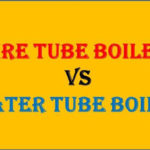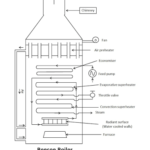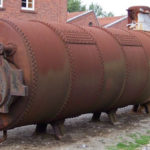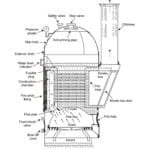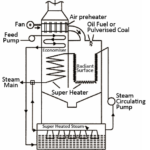There are different varieties of steel. And you are going to run into a lot of troubles if you don’t know the differences between them and when and where they are used. If you don’t know where to use boiler steel plates and where galvanized steel bars, needless to say that you are not going to make any progress in your business. When you are into industry of fabrication of boilers or pressure vessels, you need to learn a thing or two about boiler quality steel. In a nutshell, boiler quality steel is a group of steels that is used for vessels that are designed to withstand high pressures. Definitely boiler quality steel is not used exclusively for the manufacturing of boilers, but before we delve into uses of boiler steels, we need to learn the difference between the steel and its boiler quality counterpart.

What Is the Difference Between Normal Steel and Its Boiler Counterpart?
While you may be expecting the explanation containing formulas and percentage of this or that elements in the alloy. But that’s not what’s going to happen. Basically there is no difference between normal steel and its boiler quality counterpart. Steel is an alloy or iron and carbon, generally with the addition of another alloying element to improve the properties of the material. Generally, the third alloying element is added to improve the corrosion resistance or strength. The main thing about each type of steel contains around 50% of iron, while the percentage of carbon may vary from type to type. The content of carbon in boiler quality steel depends on the of the source of regulation you are tied to. For example the content of carbon in the boiler steel alloy according to the US Boiler and Pressure Vessels Code must not exceed the 0,35%. The standards in the European Union differ from that. The alloy of steel used for boilers manufacturing may also depend on the temperatures that the boiler needs to withstand. For example, if your boiler needs to withstand 850 degrees, it should be made out of carbon steel. But if your boiler needs to withstand the temperature higher than 1500 degrees, it must be made of the chromium-nickel alloy steel. The steel alloys are used for boilers manufacturing because of their cheap prices, availability, and the ability to be welded to the required shape, and because their corrosion and oxidation resistance provides long-lasting service of the boiler.
Also Read:
- What is a Boiler? Different Types of Boiler
- Difference Between Fire Tube Boiler and Water Tube Boiler
- Boiler Mountings and Accessories
The Usage of Boiler Quality Steels
As we’ve mentioned above, the usage of boiler quality steels is not limited to boilers. Actually, this type of steel is of greater importance than one can imagine. Boiler quality steels are frequently used in power generation industry. For example for heating water and to generate steam. Boiler quality steels are also used in food and pharmaceutical industries for turning the raw materials into the desired final product. Boiler steel plates are used for pressure vessels in gas and oil industry. And, believe it or not, but without boiler quality steels we would be left without 85% of what we have on the supermarket shelves.

